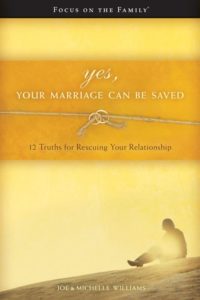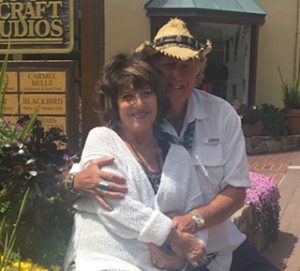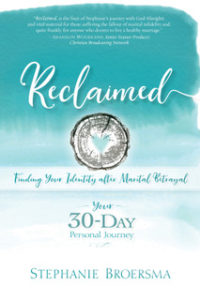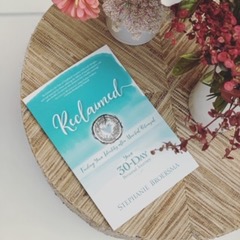RESTORING A BROKEN MARRIAGE RELATIONSHIP encompasses a number of steps and heart changes along the way. But as I’ve walked beside people over the years, the most important one that takes place in an individual’s heart prior to the marriage actually being restored is when the one fighting for the marriage is able to truly let go and give it to God.
It’s hard to do though, and it’s not easy to understand.
I talk about it a lot, and as I think about it today, I remember a conversation I had years ago at a get-together with some women who were struggling through marital separation. One of the women whose marriage had already made tremendous progress toward healing, began talking about the importance of “letting go.”
The young woman beside me knit her brow with a perplexed expression and frowned. “I get right to the point of being able to let go,” she said, pinching her fingers together as though about to drop something, “and then . . . I just can’t do it.”
The woman next to her nodded. “That’s right. Me too. That’s how I am.”
An Image from The Lord of the Rings
My husband Marv and I had recently watched all three DVD’s of The Lord of the Rings movie, and as my friend spoke, my mind immediately conjured up the image of Frodo standing on the cliff at the end of the movie. He holds his hand over the edge of the precipice with the ring dangling at the end of the chain. Beneath, is the raging fire which has been his destination all through the movie. It is the one place where he can release the ring, see it destroyed, and with it destroy the evil that is taking over Middle Earth. All he has to do is release the ring and freedom can reign once again.
“That reminds me of the ending of The Lord of the Rings,” I said. “All through the movie Frodo has been besieged by the evil that the ring has brought to Middle Earth. He has witnessed again and again the destructive power of the ring and how it corrupts those who lust over it. He’s seen the damage, the death, the devastation that it causes. And with amazing strength of character, he has persevered through all of that. He’s survived the struggle, the hardship, the temptation. He’s been willing to traverse the darkest lands and oppressive terrains and he’s endured the threats of horrendous creatures in order to get to the mountain where he can destroy the evil. But when he gets to the very end, when he’s finally there, he stands at the edge of the cliff, dangling the ring at the end of the chain. He stares at it, but can’t let go.
Sam yells to him, “Let it GO! Just let GO!”
But he can’t.
The seductive power of the ring has taken hold.”
The Trouble with Surrendering and Letting Go
As we continued to talk that evening about the challenge of letting go, I shared with my friends how The Lord of the Rings presents a perfect visual image of the struggle we have with surrendering everything to God.
Like Frodo, we don’t want to lose control. The ring of power holds us captive. Even though it means our fleshly nature will reign instead of God’s will, we can’t put it all in God’s hands. The desire to be in control holds sway over us—especially when we’re afraid that if we let go, God might not do what we want Him to do.
How many times have I seen or heard from a woman or man whose greatest desire is to reunite with their spouse? They’ve gone through the anguish, they’ve suffered hardship to get things to change. But they are unable to surrender to God to let Him take care of it. We want to do it by ourselves, even though our own methods have already failed. We somehow think if we think about it enough, talk about it enough, remind our spouse enough times, things will somehow change. We’re locked in a pattern where we keep repeating the same actions. We’re traveling in circles, or worse, we’re pushing our spouse further away. We’re afraid if we put it in God’s hands, He’ll do something we won’t like. The fear of losing control, the desire to do it our own way keeps us in bondage. We can’t let go.
But God, who created us, who created our world, who is omnipotent and sees everything . . . understands what is happening; He has answers we don’t have. He knows our spouse inside and out, just like he also knows us. He can “work all things together for good to those who love Him and are called according to His purpose*” if we can surrender it all to Him and let go of having to control it ourselves.
First, however, we have to summon the inner strength to follow through so we can let go and trust Him. He is the Good that will banish evil. He is the Light that will shine in the darkness. He is the Word of God who will enlighten our understanding and point us in the right direction.
So as we stand on that precipice, holding that ring of power, we have to have the will, the faith, the strength to let it go.
Proverbs 3:5-6 tells us to, “Trust in the Lord with all your heart and lean not on your own understanding; in all your ways acknowledge him, and he will make your paths straight.”
Seek first the kingdom of God and his righteousness and all these things will be added unto you (Mathew 6:33).
*(Rom. 8:28)
If your marriage is in trouble and you need to know how to fight for it, letting go is an important part of experiencing the victory. My books, Broken Heart on Hold and Fighting for Your Marriage while Separated can show you the path through the labyrinth of confusion so you can find the hope God has for you.
Nest week: Perhaps the hardest issue of all–infidelity.

















